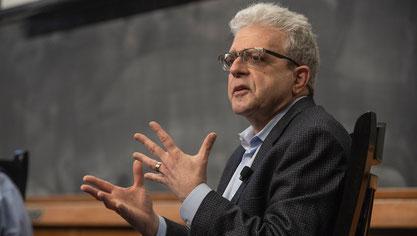|
Historian Speaks on Abuse, Memory, and Religion
By Jeffery Lindholm
The girl with the pseudonym “Mary Ross” called her experience “my little Hell.” God had abandoned her. Her desire for God endured, and what she desired was His presence. She prayed, “If you [God] really want me, you have to do something to or for me.” The next thing she remembers was waking up with scrapes all over her body. This was her sign—violence as her indication of God’s presence. Professor Robert Orsi, a scholar in American History and Religious Studies at Northwestern University, spoke of Mary Ross and others in a lecture entitled “Violence, Memory, and Religion.” The talk centered around the clerical sex abuse crisis in the Catholic Church, which came to light in the Archdiocese of Boston in the early 2000s. Orsi called clerical abuse “the worst crisis in Catholicism since the Reformation.” A historical basis is important for understanding the stories of abuse survivors. Orsi began with the early 1900s, when child abuse became a national issue. The topic of trauma was introduced into the public discourse in the 1960s and 70s. With sexual experimentation in the 1970s, the modernization of the Church after Vatican II, and overt homosexuality in the priesthood, Orsi argued that the groundwork was laid for clerical abuse. The professor then discussed psychology and sociology, removing religion from the picture for a moment. He called the priest’s role “[that of] a psychotherapist, not a priest.” Moreover, religion has been increasingly viewed as a function of psychology and sociology. Primitive ideas became advanced, objective became subjective, and “religion” became a function of technological innovation. In short, “The salience of religion drained away.” With this psychological framework in mind, Orsi explained the story of Mary Ross and a violent God, saying, “Survivors of clerical sexual abuse adhere to psychology.” Many survivors seek out violent norms of behavior, are frightened of intimacy, and can arrive at the idea of a violent God. This God “becomes [a] victim of sado-masochism.” This psychology is the basis for belief in a violent God. Orsi says that a majority of Catholics dismiss Mary Ross’s religion as “bad religion,”but some other survivors share such convictions. Another victim, called “Lucy” by Orsi, was raped at 22. She called it “a test from God.” In her struggle, she did not feel God’s presence in her suffering after the abuse. She felt abandoned, and was unsure whether God had abandoned her, or vice versa. Orsi says it is important for us to consider survivors’ memories and arrive at our own conclusions. Orsi next wanted to determine why priests, who are supposed to be servants of God, would justify sexual abuse of a minor. He pointed to the “great drama of the Eucharist.” Orsi claimed, contrary to the Church’s own belief, that the role of priest is to be both “sacrificer and sacrificed.” Orsi calls this role “the great cosmic drama.” Young people often participate in this drama with feelings of sin and guilt, because all human beings are fallen. Moreover, each society takes “exquisite care” in its own way to form children into mature adults. Abusive priests could use this combination of factors—the cosmic drama, feelings of guilt, and the need for intense instruction—to justify their sexual abuse. Orsi said, “[The] priest would take on sins of the homosexual in doing [abusive] acts and tell kids that it was God’s will. God sent the kids as a gift.” Moreover, priests could manipulate children by saying, “This is what God would want.” Therefore, Orsi concluded, kids felt bound to fulfill the priest’s desires. Orsi concluded his lecture by relating clerical sex abuse to the so-called “God of violence.” Victims like Mary Ross felt abandoned. Yet, survivors often put themselves in the place of the suffering Christ as well. In experiences of sexual violence, the victim would “become an alter-Christus [by being] rejected like Christ.” In conclusion, “God abandoned [the victim] and returned in violence.” Finally, the survivor “finds comfort in violent God…like Jesus on the cross.”
|
.
Any original material on these pages is copyright © BishopAccountability.org 2004. Reproduce freely with attribution.
